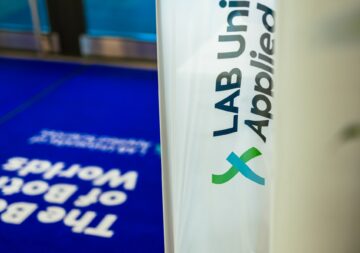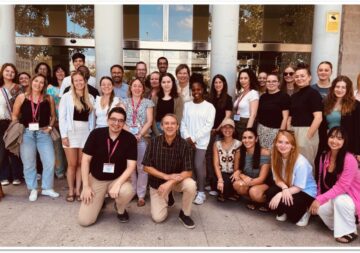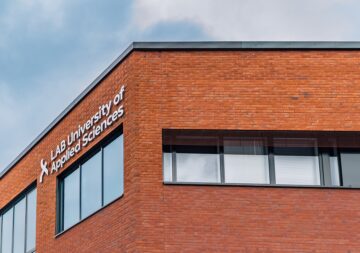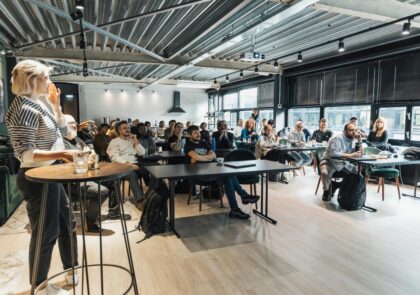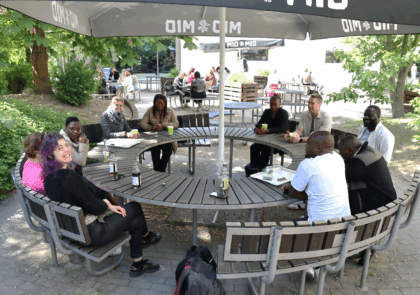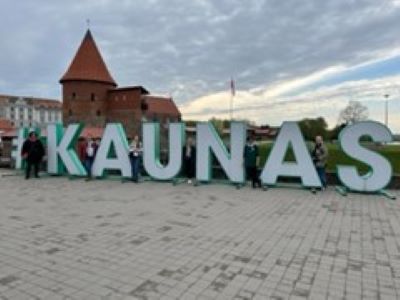
GLOBDIVES-project has developed study materials for an online course in Diversity Management and Global Citizenship as a part of its intellectual output. Now it was time to test these study materials on a face-to-face intensive course which gathered students from project partner countries Germany, Spain, Romania, Finland, and Lithuania to the second-biggest town in Lithuania, to Kaunas.
Kirjoittaja: Jaana Häkli
Prior to the mobility period students worked on a pre-assignment in national teams to learn about how United Nations’ Sustainable Development Goals are implemented in their home countries. Students had to focus on three SDGs, study the relevance of them, action and implementation plans as well as learn about what kinds of challenges relate to their implementation. Their country-specific findings had to be compared to another country of their own choice. Research findings were interesting and learning outcomes to many students something new as Sustainable Development Goals are not integrated into curricula in all project partner countries, nor are they necessarily even taught at institutions of higher education even though this is a task given for them by the United Nations as a part of the global citizenship education (UN). There are even differences between project partner countries whether or not e.g. intercultural competence is taught to students in higher education and the course of Diversity Management and Global Citizenship is expected to be completed after an introductory course in intercultural competence to deepen and to broaden the knowledge. Pre-recorded lecture videos prepared by LAB as a part of the intellectual output LAB was responsible for were helpful in completing the task. The best pre-assignment report and presentation was rewarded on the final day of the intensive programme and this time team Romania got the chance to step on the highest step on the podium. They focused in their analysis on SDGs of Quality Education, Gender Equality and Clean Water and Sanitation and had compared Romania to Japan with interesting examples of data and actions that are now being implemented in both countries.
Diversity enriches teamwork
Team LAB consisted of students from degree programmes such as business administration, media design, social services as well as the team had one Ecuadorian representative from the international degree programme of international business taught in Lappeenranta. The group was diverse also when it came to age as the oldest participant was 50 years old, a career changer, whereas other team members were in their 20s. Differences in degree programmes or age did not matter, but the diversity of the group could really be seen as a richness contributing to students’ understanding that people have different kinds of stories to share about their life experiences and different kinds of opinions from the point of view of their field of study for example to questions of diversity. LAB team’s spirit was high during the entire intensive programme.
Intensive programme’s academic content consisted of lectures from accompanying lecturers from project partners, streamed sessions from abroad, and students had a chance to experience Lithuanian culture on a guided walking tour and a brewery visit in Kaunas. During classes interactive activities were utilized especially in teaching about diversity where the focus was on cultural diversity. Students learned about how unconscious biases affect decision making for example in recruitment processes and how students from different corners of Europe had a lot in common and were willing to share even painful aspects of their life when a psychologically safe environment for sharing and learning had been created. It was surprising to see how easily students who had only known each other for a few days were willing to share about their lives and cultures to others. In addition, a case study on conflict management in cultural diversity, a panel discussion on global values and how global challenges are seen from different points of views raised interesting points of views and comments among students. In the main assignment of the week multicultural teams of students had to act as consultants to a multinational company and provide suggestions for the company on how to develop company’s contribution to SDGs and to develop company’s diversity, equity, and inclusion aspects. I wish those company representatives had been there listening to students’ proposals because they were very good, and the quality of the research conducted within a very restricted time frame was surprisingly high. Teams were critical also towards the CSR and DEI work companies had conducted earlier on which showed that their understanding of green washing and the need for data and transparency in DEI and CSR actions had developed. This learning was also documented in student feedback as an average of 4.6/5 was gained from participating students about whether they felt that their understanding of SDGs and global citizenship had developed.
It was great to see how RDI work conducted together with European partners brought students and teachers together to learn also from each other and to network. All study materials produced will be shared among project partners which will be a win-win situation to all.
References
United Nations. Global citizenship. Cited on 15.6.2023. Available at https://www.un.org/en/academic-impact/global-citizenship
Author
Jaana Häkli is a Senior Lecturer at LAB University of Applied Sciences and works as a project manager for the GLOBDIVES project.
Illustration: Team of LAB students in Kaunas, Lithuania (Photo: Jaana Häkli)
Published 1.8.2023
Reference to this article
Häkli, J. 2023. Intensive programme in global citizenship and diversity. LAB Pro. Cited and date of citation. Available at https://www.labopen.fi/en/lab-pro/intensive-programme-in-global-citizenship-and-diversity/
